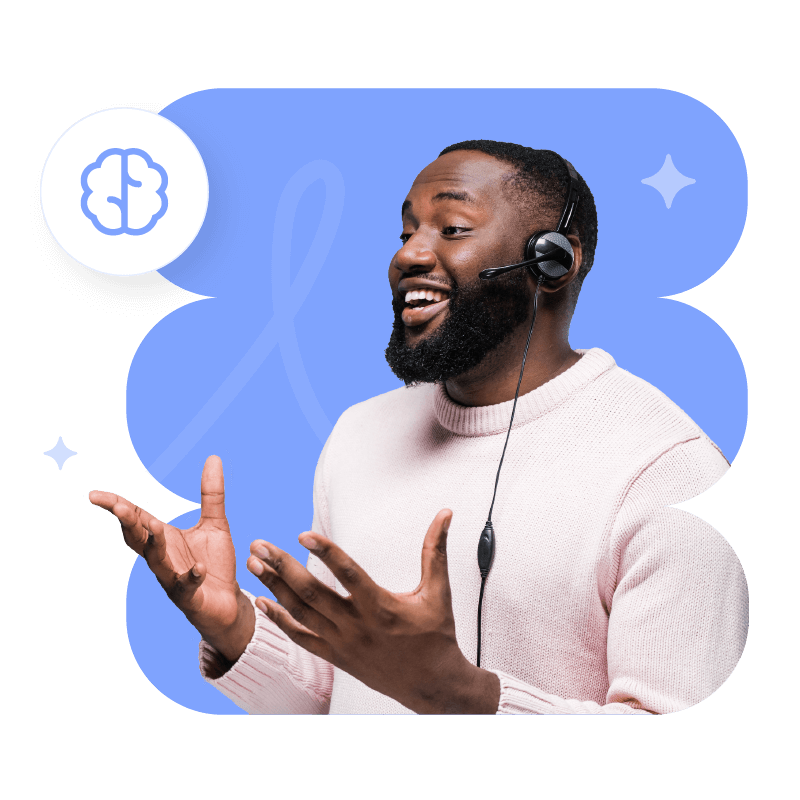Summary
- What is Call Center Coaching?
- Why Is Call Centre Coaching Crucial for Success?
- The Core Components of an Effective Call Centre Coaching Model
- Key Types of Coaching for Call Centre Managers
- A Step-by-Step Guide to a Call Centre Coaching Session
- Overcoming Common Call Centre Coaching Challenges
- The Role of Technology in Modern Call Centre Coaching
- Conclusion: Build a Culture of Continuous Improvement
- Call Centre Coaching FAQ
- Citations
By providing effective coaching, call centre trainers can equip agents with the necessary skills and knowledge to handle customer interactions efficiently. But a common call centre coaching challenge is that it takes a significant amount of time, both in terms of preparation, execution, and follow-up. After all, how can you scale coaching when you have multiple customer service representatives handling hundreds or even thousands of calls?
In this article, we will explore what call centre coaching is, call centre coaching technology that streamlines and scales the process, and share eight best practices to create a stellar call centre coaching strategy.
Conduct regular one-on-one coaching sessions with agents. Use this time to address individual performance concerns, provide personalised feedback, and offer guidance on overcoming challenges. These sessions help build rapport and trust between trainers and agents.
What is Call Center Coaching?
Call centre coaching is a process through which trainers guide and support agents to enhance their skills, knowledge, and performance when handling customer interactions. Coaching involves providing feedback, offering training, and implementing strategies to help agents deliver exceptional customer service and achieve their performance objectives.
Technology like VoIP software has become a key tool to facilitate coaching, with multiple features that automate, streamline, and ultimately optimise your call centre coaching. Whether your focus is sales prospecting techniques or customer service, a VoIP phone can provide strategic insights and tools that empower managers and agents to do their best work.
Why Is Call Centre Coaching Crucial for Success?
Business coaching goes much deeper than standard training. It is about personalised development that builds an agent's confidence and skills. This focus on the individual has a direct, positive effect on important business goals.
- Improved Agent Performance: Training coaching helps agents sharpen their skills in communication, problem-solving, and product knowledge. This leads to better performance on key metrics, more consistent service for customers, and ultimately improved customer retention.
- Enhanced Customer Experience (CX): Well-coached agents are better prepared to handle customer inquiries with both empathy and efficiency. This is vital, given that 80% of customers believe the experience a company offers is as important as its products [1].
- Higher ROI: Putting resources into strategic coaching creates real financial benefits. Through improved efficiency and customer loyalty, coaching delivers a strong return on investment. Using AI for business coaching can increase this ROI even further by providing data-backed insights.
The Core Components of an Effective Call Centre Coaching Model
A great coaching program is built on several core components. These elements work together to create a structured and supportive path for agent growth and are a key part of any effective call centre strategy.
Setting Clear and Achievable Goals
The first step to effective coaching is making sure everyone is on the same page. Agents need to know exactly what is expected of them.
- Set clear performance standards and behavioural expectations from day one.
- Use SMART goals: goals that are Specific, Measurable, Achievable, Relevant, and Time-bound. For example, instead of a vague goal like "get better at customer service," a SMART goal would be, "Increase your personal Customer Satisfaction score by 5% over the next three months."
- Help agents understand how their personal goals help the team and the entire company succeed.
Leveraging Data and Key Performance Indicators (KPIs)
Coaching should be based on facts, not feelings. Using data ensures your feedback is objective and focused on the most important areas for improvement.
- Customer Satisfaction (CSAT): A score that measures how happy customers are with a specific interaction, usually measured via survey.
- First Contact Resolution (FCR): The percentage of customer issues resolved on the very first call.
- Average Handle Time (AHT): The average duration of a customer call.Net Promoter Score (NPS): A measure of long-term customer loyalty.
Use data from call monitoring and analytics to find specific areas where each agent can improve. This data-driven approach is key to creating personalised development plans [3].
Providing Constructive, Actionable Feedback
The way you give feedback is just as important as the feedback itself. Your goal should be to empower your agents, not discourage them.
- Use the "feedback sandwich" method. This involves starting with praise, offering constructive criticism, and then ending with another piece of positive reinforcement [4].
- Give feedback as soon as possible after an event. Be specific and focus on behaviour, not personality. For example, instead of "You sounded rude," try "On that last call, I noticed the customer spoke over you. Let's discuss some techniques for controlling the conversation."
- Provide real-time feedback and encouragement whenever possible.
Fostering a Supportive and Trusting Environment
For coaching to truly work, it must be built on trust. Agents need to feel safe enough to admit challenges and accept feedback.
- Create a psychologically safe environment where agents feel comfortable discussing difficulties without fear of being punished.
- Show agents that you are their partner in growth and are invested in their success.
- Celebrate wins and recognise improvements to boost team morale. A personalised development plan combined with high morale is a powerful formula for success [5].
Onboard your team easily onto Empower by Ringover and see the way the conversational AI transforms your results for the better.
Key Types of Coaching for Call Centre Managers
Different agents and situations require different coaching methods. As a manager, you can use several types of coaching to address the unique needs of your team.
- Performance Coaching: This is the most common type, focusing on hitting specific metrics like AHT or FCR.
- Skills Coaching: This approach concentrates on building specific abilities, like active listening, empathy, or conflict de-escalation.
- Team Coaching: These are group sessions designed to improve how the team works together, collaborates, and delivers consistent service.
- Well-being Coaching: This type of coaching focuses on helping agents manage stress and avoid burnout, which is essential for a healthy work environment.
A Step-by-Step Guide to a Call Centre Coaching Session
Following a clear structure for your one-on-one coaching sessions ensures they are focused, productive, and lead to real improvement.
Step 1: Prepare for the Session
- Review the agent's recent performance data, KPIs, and call recordings.
- Choose one or two specific areas to discuss to keep the session focused.
- Prepare positive examples to share, as well as examples that show an opportunity for improvement.
Step 2: Conduct the Coaching Conversation
- Start the session with a positive tone and clearly state its purpose.
- Ask the agent to evaluate their own performance first. Questions like, "How do you feel that call went?" can provide valuable insight.
- Listen to call recordings together, pausing to discuss specific moments.
- Use open-ended questions like, "What is another way you could have handled that?" to help the agent discover solutions on their own.
Step 3: Create an Action Plan
- Work together to create a clear action plan with one to three specific steps for the agent to take.
- Use role-playing to let the agent practice new skills in a safe environment [4].
- Make sure the agent understands and agrees with the plan and feels confident they can achieve it.
Step 4: Follow Up and Track Progress
- Schedule your next coaching session before the current one ends.
- Provide informal check-ins and positive reinforcement when you see the agent making progress.
- Combining consistent coaching with formal sessions is the foundation of an effective training coaching program that leads to rapid skill growth.
Overcoming Common Call Centre Coaching Challenges
Even the best managers run into challenges. Many organisations do not have a standard way of coaching, which can lead to inconsistent results and repeated errors [6].
- Time Constraints: Managers are busy. Try "micro-coaching"–short, 5-10 minute feedback sessions–to stay on top of performance. Technology can also help by automatically finding moments that need coaching.
- Agent Resistance: If an agent is defensive, focus on building trust. Show them how coaching benefits them directly, such as through better performance that could lead to bonuses or promotions.
- Measuring ROI: To prove that coaching is worth the time, track how it affects your KPIs. Show upper management the direct link between your coaching efforts and improvements in CSAT, agent retention, and other key metrics.
The Role of Technology in Modern Call Centre Coaching
Modern technology can transform your coaching efforts. A conversational AI platform like Empower by Ringover gives managers powerful AI tools to make coaching more efficient and impactful.
- Sales Role Playing: Pitch Room offers realistic role-playing for sales agents, so they can easily onboard or upskill, depending on their individual needs. Agents can easily practice tough conversations and refine their sales pitch, ensuring they have the confidence necessary to close a deal once they are face-to-face with a prospect.
- Conversation Intelligence: Ringover's AI tools can transcribe, summarise, and analyse 100% of your calls, automatically flagging keywords (call moments), semantics, and a call library for coaching. This saves managers from having to manually listen to hours of calls.
- Centralised Data: The right technology is a core part of your call centre staffing and management plan because it puts all performance data in one place, making it easy to track agent progress over time.
- AIRO Coach: Empower's AIRO Coach provides agents with real-time suggestions during calls, helping them follow sales scripts and find information instantly. Every call is a learning moment, helping agents improve performance without the need for long-term shadowing. The user-friendly interface ensures agents don't lose focus as they ontake feedback, tips, and the key points to make.
While technology is a fantastic tool, it is important to balance it with human insight. The most productive call centres use technology to find opportunities and then use human coaching to connect with agents and drive real change [7].
Conclusion: Build a Culture of Continuous Improvement
To summarise, effective call centre coaching is data-driven, personal, consistent, and supportive. It is not a single task but an ongoing commitment to building a stronger, more capable team. By investing your time in becoming a great coach, you become a leader who empowers agents to become excellent brand ambassadors. This dedication to coaching is a pillar of modern call centre training and the key to delivering truly exceptional customer service.
To start your training program off on a strong foot, consider starting your free trial of Empower by Ringover. You'll see the difference an AI tool makes!
Call Centre Coaching FAQ
What is coaching in a call centre?
Call centre coaching is a structured process where managers or team leaders guide agents to improve their performance, communication, and customer service skills. It goes beyond performance monitoring–it's about helping agents understand their strengths, identify growth areas, and develop strategies for improvement.
Effective coaching focuses on real call interactions, using tools like call recordings and conversation analytics to provide actionable feedback. With platforms such as Empower by Ringover, managers can automatically analyse tone, keywords, and talk-to-listen ratios to coach based on real data–turning every call into an opportunity for skill development.
Which course is best for a call centre job?
The best course depends on your career goals within the call centre industry. For entry-level agents, customer service and communication courses from providers such as Coursera, Udemy, or LinkedIn Learning are excellent starting points.
For managers or team leaders, specialised training in call centre leadership, workforce management, and quality assurance is recommended. Many businesses also invest in Ringover's call centre coaching solutions, which combine AI-driven insights with live training–helping teams continuously improve through real-world data and performance feedback.
What are the 7 important call centre skills every agent should have?
Every successful call centre agent needs a combination of soft and technical skills to provide an outstanding customer experience. The seven essential call centre skills include:
- Active listening – Understanding customer needs without interrupting.
- Clear communication – Speaking concisely and professionally.
- Empathy – Showing genuine understanding and care for customer issues.
- Patience – Staying calm under pressure or during challenging interactions.
- Product knowledge – Being confident about company products or services.
- Problem-solving – Quickly identifying and resolving customer concerns.
- Adaptability – Handling different types of calls, tools, and customer personalities.
Ongoing coaching helps agents refine these skills. Using AI-powered tools like Ringover, managers can monitor calls, identify skill gaps, and deliver targeted coaching to strengthen these core capabilities.
How much to charge for coaching calls?
The rate for coaching calls varies depending on experience, expertise, and the complexity of the training. Professional call centre coaches or consultants may charge anywhere from $75 to $300 per hour, while internal coaching is often included as part of a manager's role.
If you're providing structured call centre coaching as a service, consider offering customised packages–for example, group coaching sessions, one-on-one mentoring, or AI-assisted performance reviews using Ringover's Empower analytics. These value-added features allow you to justify higher rates while delivering measurable improvements in performance and ROI.
How do you train for a call centre job?
Training for a call centre job typically involves a combination of classroom sessions, product knowledge training, role-playing exercises, and on-the-job training. New agents learn about company policies, customer service techniques, and system processes. They also receive training on handling different types of customer interactions. Here are 10 steps to follow when training for a call centre job:
- Orientation to meet relevant people and learn policies, procedures, and company culture.
- Cover product and service offerings so the agents understand features, benefits, and common queries.
- Learn tools and technology in use so they can use features like call routing and integrations with other software like Bullhorn, Salesforce, or HubSpot for example.
- Emphasise active listening.
- Outline effective communications skills include phrasing, tone, and concise language.
- Lay out the proper customer service etiquette to make a good impression on callers.
- Engage in role play and simulations to practise skills in a safe space.
- Ensure quality customer service with call monitoring.
- Continue education of agents and managers so your service continues to elevate.
- Deliver regular performance evaluations and feedback so agents understand where they are at and where they should be.
How can I be a good call centre trainer?
To be a good call centre trainer, it is important to have the following:
- Excellent communication skills
- A deep understanding of customer service principles
- The ability to motivate and inspire agents.
- Actively listen to agents' concerns
- Provide constructive feedback
- Create a positive learning environment
- Continuously update your knowledge of industry trends to deliver effective training
What is coaching in customer service?
Coaching in customer service refers to providing guidance, support, and training to agents to enhance their customer service skills. This ongoing process focuses on helping agents improve their communication, problem-solving, and empathy, resulting in better customer experiences and increased customer satisfaction.
It is a partnership between manager and agent, aimed at helping the agent reach their full potential. This guide will give you, the manager, a clear roadmap to implement coaching strategies that boost both individual performance and your company's bottom line.
Citations
- [1]https://scorebuddyqa.com/blog/contact-center-coaching-techniques-strategies
- [2]https://callcriteria.com/call-center-coaching
- [3]https://qevalpro.com/blog/agent-performance-coaching-and-training
- [4]https://nice.com/blog/coaching-call-center-agents-into-top-performers
- [5]https://amplifai.com/blog/agent-coaching
- [6]https://amplifai.com/blog/call-center-coaching-effectiveness
- [7]https://invoca.com/blog/understanding-call-center-productivity
Published on October 13, 2025.



